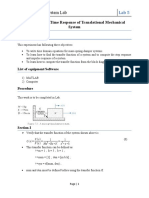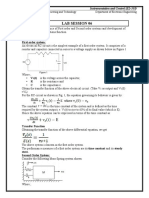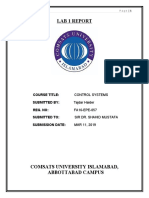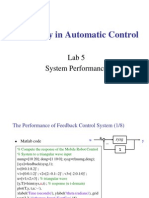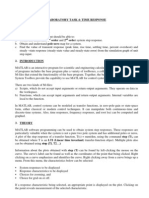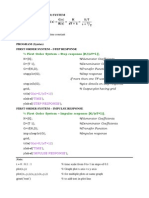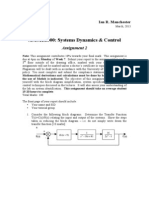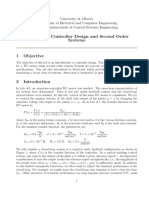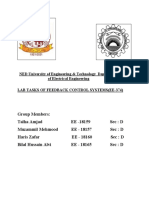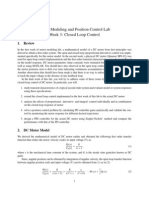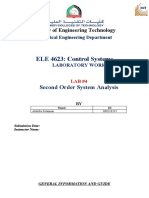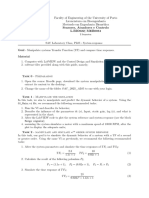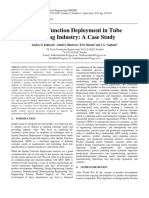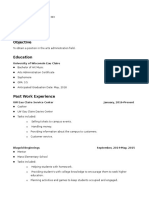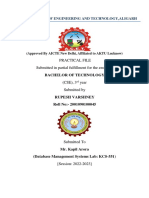FACULTY OF MECHANICAL TECHNOLOGY AND ENGINEERING
UNIVERSITI TEKNIKAL MALAYSIA MELAKA
CONTROL AND INSTRUMENTATION
BMKT 3743 SEMESTER 2 SESSION 2024/2025
LAB 3: TIME RESPONSE SIMULATION USING SCILAB
COURSE/GROUP SECTION
DATE
1.
NAME &
MATRIX NUMBER
Ts. MUSTAFA BIN MANAP
NAME OF INSTRUCTOR
EXIMINAR’S COMMENT VERIFICATION STAMP
TOTAL MARKS
1
� Lab Assessment Rubric
Display the concept of controller and sensor elements/ transducer through learning
CLO3:
and application of the device behaviour
Very Weak
Very Good
Weak
Good
Fair
Assessment Attribute Subattribute Level 1 2 3 4 5 Weightage Score Marks
Almost ready to Ready to perform
Almost very ready to
Show readiness to perform a perform simulation simulation work and Very ready to perform
P2 (Readiness) Not ready at all perform simulation 1
simulation work work and require require minor simulation work
work
further improvement improvement
Imitate or follow instruction Not able to imitate or Able to imitate or Able to imitate or Able to imitate or follow Able to imitate or
carefully to perform a P3 (Guided Response) follow instruction follow instruction with follow instruction with instruction without follow instruction 3
simulation work carefully full guidance minimal guidance guidance carefully
Observation Application of
through simulation modern engineering
Not able to measure Able to measure the Able to measure the
work tools Measure the control system the control system control system control system Able to measure the Able to measure the
performance by using P4 (Basic Proficiency) performance and performance and performance and control system control system 4
appropriate tools require major require further require minor performance well performance very well
improvement improvement improvement
Not able to use Able to use software Able to use software
Demonstrate properly the use Able to use software Able to use software
P5 (Expert Proficiency) software and require and require further and require minor 2
of software well very well
major improvement improvement improvement
Total
%
�1.0 LEARNING OUTCOMES
Understand the characteristic of time response curve by Scilab software as simulation tool.
2.0 EQUIPMENT
Computer with Windows operating system
Scilab Software version 5.4.1 or higher
Scientific calculator
3.0 PROCEDURE
Task 1: Using Xcos.
1. Xcos is a graphical editor embedded in Scilab software. It is use to design hybrid dynamical
systems models.
2. To start Scilab, double-click the Scilab icon on the desktop or select from pull down menu
from Start.
3. In Scilab menu, click on Application > Xcos to invoke Xcos application.
4. Alternatively, insert command ‘xcos’ at Scilab Console.
5. Xcos application will be lunch immediately.
6. In order to get the output response for the open loop system in below figure, activate Xcos
pallete browser.
4
Input, u(t) 𝐺(𝑠) = Output, y(t)
𝑠 2 + 2𝑠 + 10
2
�7. In Palette Browser window, select step function block from source category.
8. Repeat the step above to drag CLR (Transfer Function), CSCOPE and CLOCK_c blocks.
9. Right click on CLR block period, and then click on block parameters to adjust its setting as
below.
10. Configure CLOCK_c block period to 0.001
11. Connect all block properly and the final model window will look like this:
12. From main menu, click on Simulation > Setup then set final integration time at 10 second
(1.0E01).
13. Run the model and observe output generated from Scope.
14. U may need to adjust graph scale by click Edit > Figure properties to get better view.
3
�15. To pickup specific point value on graph, click Edit > Start datatip manager then click on
desired point.
Question Task 1:
a) Obtain Peak Value (Vp), Final Value (Vfinal), Peak Time (Tp), Rise time (Tr), Settling time
(Ts) and Percent of overshoot (%OS) from output response graph.
b) From transfer function used in simulation, calculate all step response characteristic
parameters and compare your result with value obtained from Assignment 1(a).
c) Obtain step response for the following transfer function and then compare your result with
(a). (Hint – Comment on Vp, Vfinal, Tp, Tr, Ts, and %OS )
24.542
𝐺(𝑠) =
𝑠2 + 4𝑠 + 24.542
d) Obtain step response for the following transfer function and briefly describe step response
obtained. (Hint – Type of response, Vfinal, and Tr )
4
𝐺(𝑠) = 2
𝑠 + 4𝑠 + 4
e) For a closed loop system with unity feedback and transfer function below, simulate the
output response of the system given a step input.
4.0 NOTE (Second order step response specification)
4
�5.0 REPORT FORMAT
a. Use provided front page for your report (1st page of this lab sheet).
b. Report should be in handwritten except front page.
c. Contents of report :
i. Introduction - briefly state and explain lab objectives and what u have done on this
lab,
ii. Result of each task - write appropriately. Support your documentation with
graph/diagram/figure/table (Draw by hand or printed).
iii. Answer all questions given.
iv. Conclusion.
-END-

